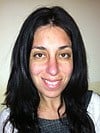Last year, as part of an alternative Rosh Hashanah service I attended, we discussed one of the central themes of the holiday—kingship. It was interesting to note how many of us ‘moderns’ struggle with the concept of an external authority who is judging us and then determining our destiny. Many of the participants spoke about the contradiction between the Jewish liturgy, which depicts an external God as the source of authority, and the more contemporary idea that our internal conscience should guide our actions. I, too, shared this discomfort, so I found it interesting that Parashat Vayelech, read between Rosh Hashanah and Yom Kippur, offers a more balanced perspective on the various loci of power in the Torah.
The parashah begins with the familiar model of biblical hierarchy: At the end of their 40-year journey in the desert, the Israelites are accustomed to relying on external authority. This is most obvious in their relationship with God, who feeds them manna from heaven and accompanies them through pillars of cloud and fire. In addition to providing sustenance and protection, God also demands obedience, explicitly using reward and punishment to ensure the Israelites observe the commandments. The Israelites also rely on external human leadership, looking to Moses—and later Joshua—as authorities on every aspect of theology, law and daily life. In this parashah, Moses emphasizes that God and Joshua will march ahead of the people, leading them into Canaan.[1]
But when the Israelites enter the Land of Israel, they will experience a shift in their relationship to authority. They will transition from dependence on an overt God and strong leaders to worship of a more concealed God and rule of law dictated by weaker, short-term judges. This evolving relationship with external authority will require a cognitive shift away from simple dependence towards greater empowerment.
This need for a shift in consciousness is reflected in this parashah, when God instructs Moses to teach the people a song—shirah—that they must learn by heart (literally, ‘put it in their mouths’[2]). This shirah speaks about the Israelites’ past, their future demise and eventual redemption. While the content of the song characterizes God as a powerful authority figure, the instruction that the Israelites internalize the song indicates that the locus of authority was ultimately to reside in the people. The song gives them an internal voice that can guide them through life’s complex choices and struggles. The song signifies a shift from utter dependence on external authority to an empowered knowing from within. The people need less authoritative leadership because they are developing an inner conscience that both upholds and engages their covenant with God.
This tension between depending on external leadership or finding an inner sense of authority within ourselves and our communities is a challenge we face in civic life today. Do we place our destiny in the hands of our leaders, those with official titles of power, or do we assume responsibility ourselves for maintaining our nations’ ethical course?
In South Africa, where I live, a tragic event has made many people think about this dialectic between political leadership and the internal voice of the people. Several weeks ago a group of miners demonstrated for an increase in wages. During the protest, the miners charged at the police. Unprepared and lacking rubber bullets, the police fired live ammunition on the miners, killing almost 40 of them[3]—a tragedy that is reminiscent of the Apartheid era when the police notoriously opened live ammunition on demonstrators.
After this event, the press bemoaned the absence of strong leadership in our country. How could the police have let this happen? How could those who run the mines have let this happen? Why didn’t the government take a strong stand to condemn the killings? As everyone apportioned the blame at a different leader, a pervasive atmosphere of despair filled the country. A few wise journalists commented that the only way forward was for individuals and communities to assume responsibility; for civil society to remember the core values of our country—the shirah, so to speak—and to chart the way, because leadership had let us down.[4]
At the same time, the eyes of the world watch America keenly in the build-up to the U.S. elections. With all the emphasis on who will come into power, it is important to remember that responsibility for the future of the country does not belong to the President alone; it also resides with the people.
The ideal power structure is a balance: On the one hand, we need to honor the fact that ‘external’ leadership does matter—elected leadership has the capacity to bring about significant change. Yet, we must not forget the force and influence of our inner shirah—the power of the people to lead their own way on a just path.
The Torah represents this balance. As described in Parashat Vayelech, the Torah is kept in an ark but brought out every seven years and read to the people. The Torah is a physical embodiment of God’s word, but as a text, it requires human interpretation and engagement. Neither solely a voice of external authority, nor purely an inner, subjective voice, the Torah symbolizes the balance between internal and external authority. As we approach the end of this cycle of Torah reading and reflect on the ways in which we bring our own voices to this Divine text, let us apply this model to our understanding of authority and responsibility, by both taking our elected leadership seriously and engaging deeply and actively in the destiny of our countries and our planet with the inner knowing of our shirah.
[1] Deuteronomy 31:3.
[2] Deuteronomy 31:19.
[3] Michelle Faul, “South Africa Mine Shooting: 150 Miners Claim Beaten In Custody,” Huffington Post, 27 August 2012. http://www.huffingtonpost.com/2012/08/27/south-africa-mine-shooting-miners-beaten_n_1833604.html
[4] Paul Berkowitz, “Tinkering with the great machine: how do we get the society we want?” Daily Maverick, 21 August 2012. http://dailymaverick.co.za/opinionista/2012-08-21-tinkering-with-the-great-machine-how-do-we-get-the-society-we-want

